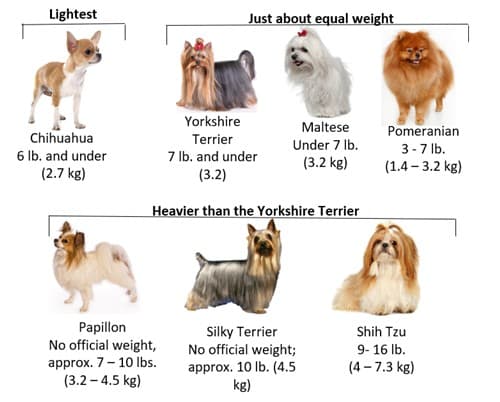Weight
Yorkshire Terrier Weight
Overview
The Yorkshire Terrier is one of the smallest toy breeds in terms of weight. Though, the weight range seen in breed standards is just one part of the equation. Pet Yorkies (that do not appear in conformation events) can be considerably larger and heavier than their show dog counterparts.
This section will covers how much Yorkshire Terriers weigh per breed standards of the major kennel clubs of the world, a weight comparison with other popular toy breeds, photo examples of Yorkies at different weights, and how much pet Yorkshire Terriers weigh according to a detailed survey of 2,146 Yorkie owners.
Yorkshire Terrier Weight per Breed Standards
There are four major kennel clubs in the world:
- The AKC (American Kennel Club)
- The CKC (Canadian Kennel Club)
- The FCI ((Federation Cynologique Internationale) is an international federation of 90+ member countries.
- The KC (Kennel Club of the United Kingdom)
Each is in agreement regarding the weight range and weight limit of Yorkshire Terriers that appear in their sponsored conformation events (competitions to judge dogs in accordance with how closely they fit the guidelines of an ‘ideal’ specimen of the breed). Please note that 7 lbs. = 3.2 kg.
AKC: Must not exceed 7 pounds
FCI: Up to 3.2 kg
CKC: The weight not to exceed 7 lb.
KC: Weight up to 3.2 kgs
Yorkshire Terrier Weight Compared to Other Toy Breeds
The Yorkshire Terrier is one of 21 dog breeds in the AKC’s toy group. Let’s see how the Yorkie’s weight compares to other popular dogs in this classification. Do keep in mind that these weights are not necessarily those of household pets, but rather are the expected weights of dogs competing in conformation events; many canine family members are larger than what is seen in the show ring (details coming up).


The Chihuahua’s maximum weight is slightly smaller than the Yorkshire Terrier’s. It is a tiny 6 lbs. compared to the Yorkie’s diminutive 7 lbs.
Two breeds, the Maltese and the Pomeranian, have very similar weight ranges to the Yorkshire Terrier, at or just under 7 lbs. maximum. While none of these three breeds have official heights (measured from floor to withers which are the top of the shoulder blades), expected heights do vary a bit (when falling into that desired weight range). For the Yorkie it’s 8-9 inches, for the Maltese it is slightly taller at 8-10 inches, and for the Pom it’s 7-12 inches.
There are lots of toy breed dogs with heavier weights than the Yorkshire Terrier. Above in the chart, we look at three that are comparable but larger to varying degrees. The Papillion is just a bit bigger at 7 to 10 lbs. The Silky Terrier (which was developed using the Yorkshire Terrier and the Australian Terrier) does not have an official weight but is typically sturdier at around 10 lbs. And, the Shih Tzu can easily be double the weight of a Yorkie at 9 to 16 lbs.
Yorkshire Terrier Breed Standard Weight vs Reality
The only time that breed standard weight ranges are an absolute rule, and not merely a guideline, is in the conformation showring where being under or over a listed weight can mean disqualification from the event. Putting that aside, for pet owners it offers a general idea of what to expect and for breeders it offers an ideal to strive toward.
Owners of toy breeds can be thrown off balance if they assume that all Yorkies, or all ‘well-bred’ Yorkies, simply must be the listed ‘7 lbs. and under’ as full-grown adults. The truth of the matter is, while quite a few Yorkshire Terriers are indeed that small, a good number are larger.
In most cases this is due to bone structure, in some cases it is due to carrying excess weight, and in a small number of cases this is due to the dog in question being a mixed breed or even perhaps a Silky Terrier (that looks quite similar to a Yorkshire Terrier but whose stature and weight is slightly heavier).
So, if you are planning on bringing a new Yorkie puppy into your home and want confirmation that you’ll have an ‘under 7-pound’ adult dog, the closest you’ll get to a guarantee is that this most likely will be the case, but your dog may indeed be slightly larger. And, if you have a Yorkie that is a bit larger than 7 lbs., you are not alone (more details ahead under 'Actual Weight Range of Pet Yorkshire Terriers'.
Photo Examples of Adult Yorkshire Terriers at Different Weights
A Yorkie on the small side:


This is Mina, at 2 years old and weighing 3 lbs. and 5 oz. (1.5 kg)
She is very light-boned and dainty
Photo courtesy of Silvia
A Yorkie at the top weight of the AKC breed standard:


This is Chiqui, at 2 years old and weighing 7 lbs. (3.2 kg)
Though this is at the top of breed standards, it is certainly still tiny
Photo courtesy of Keith C.
A Yorkie that weighs somewhat more than expected:


This is Womble, at 1 and 1/2 years old and weighing 11 lbs (5 kg),
Though this cutie pie is a bit larger than the standard, this is still a small dog
Photo courtesy of Tony Tree
A Yorkie that weighs a lot more than expected:


This is Osso, a 4-year-old Yorkshire Terrier that is significantly heavier than expected
at a whopping 17 lbs. (7.7 kg).
Not only does Osso appear to be a purebred Yorkie, his owners state that both
his parents and grandparents are personally known to the family and are purebred. But, this is not
to say that another breed is not somewhere back in the bloodline.
And, as you can see, he is does not appear overweight; rather,
he seems to simply have very large bone structure.
Photo courtesy of Karina Hernandez
Actual Weight Range of Pet Yorkshire Terriers
In 2017, we conducted a comprehensive survey of Yorkshire Terrier owners. There were 2,142 respondents in all with 72% in the US, 8% in the UK, 8% in Canada, and the remaining 12% in various other countries.
We asked a wide range of questions including ‘How much does your Yorkshire Terrier weigh?’ and that particular question was only asked to those that had adult Yorkies (age 1 year and up). Therefore, this excluded the 279 people that had puppies and this query was presented to the remaining 1867 owners.
The answers may surprise you:
2.5 lb. (1.13 kg) 2%
3 lb. (1.36 kg) 2%
3.5 lb. (1.58 kg) 5%
4 lb. (1.81 kg) 7%
4.5 lb. (1.81 kg) 8%
5 lb. (2.26 kg) 8%
5.5 lb. (2.49 kg) 7%
6 lb. (2.72 kg) 9%
6.5 lb. (2.94 kg) 6%
7 lb. (3.17 kg) 6%
7.5 lb. (3.40 kg) 5%
8 lb. (3.63 kg) 11%
More than 8 lb. (3.63 kg) 21%
I'm not sure 3%
From these findings, it's evident that the majority of adult Yorkshire Terriers, totaling 60%, fall within the breed standard weight range of 2.5 lbs. to 7 lbs. Notably, no Yorkshire Terriers in the survey were under 2.5 lbs.
Moreover, a significant proportion of adult Yorkshire Terriers, accounting for 37%, exceeded the 7 lbs. mark. Of these, 21% weighed over 8 lbs.
Another perspective on Yorkshire Terrier weights, especially concerning household pets rather than show dogs, reveals that approximately 6 in 10 adult Yorkies weigh between 2.5 and 7 lbs., while approximately 4 in 10 Yorkies exceed this expected weight range.
Note that the full survey results that includes everything from hairstyles to ear set and behaviors to health issues are included in our book, Y.I.C.’s GIANT Book of Yorkshire Terrier Care.
Large Bone Structure vs Being Overweight
With most Yorkies that are over 7 lbs., this is just a matter of having larger than average bone structure, something that is entirely possible when breeders are producing Yorkies on the higher end of the weight scale (6 to 7 lb. range).
That said, in some cases, this is indeed a matter of carrying a few extra pounds, something that is entirely possible even with this very small toy breed dog. If you suspect that your Yorkie is overweight, the best way to confirm this is by having your dog examined by the veterinarian. And, if it is found to be the case, there are some stress-free ways to help your Yorkie lose a few pounds. Do keep in mind that maintaining a healthy weight plays a huge role in averting a wide range of health issues.
A small number of cases in which a Yorkshire Terrier exceeds the expected weight range can be contributed to another larger breed being somewhere in the bloodline or it can be a matter of a ‘Yorkie’ actually being a Silky Terrier. When comparing Yorkshire Terriers to Silky Terriers, you will see that they look very similar with one of the differences being weight.
Caring for a Yorkie on the Small End of the Weight Scale
All Yorkshire Terriers, even if they are over 7 lbs. are considered small dogs. And, for this reason, special care should be given to help avoid common injuries and issues seen with toy-sized breeds. This is even more applicable if you have a tiny Yorkie that is in the 2 to 5 pound range. The smaller a dog is, the more danger of being stepped on or accidentally tripped over. And, falls from your arms or jumps down from furniture are more likely to cause injury, including fractures and broken bones.
Some very important safety tips for Yorkshire Terriers
include preventing paw injuries, using a harness (not a collar), dog-proofing the house and yard, taking care near other larger dogs, keeping your Yorkie safe in the car, keeping your Yorkie warm enough, and working to prevent falls.
For tiny Yorkies, the risk of hypoglycemia increases; this is a rapid drop in blood sugar levels with one of the major causes being meals spaced too far apart. For this reason, feed your Yorkie 3 meals per day plus several healthy snacks.
A Final Note
If your Yorkshire Terrier is larger than you expected him or her to be, do be sure that this is not a matter of being overweight. If it is determined that your Yorkie simply has larger-than-average bone structure, hopefully you will appreciate and love your guy or gal for all of their attributes including their sturdier size.
And, in fact, being larger than expected can be a good thing. Larger and more solidly-built Yorkshire Terriers are less prone to size-related injury including being accidently dropped, stepped on, and tripped over. In addition, the risk of bone fractures that can occur when jumping down from heights decreases the larger a dog is.
You May Also Like:
Being Allergic to a Yorkshire Terrier- Dogs with hair are not necessarily hypoallergenic. Dander and proteins found in saliva and urine can cause allergic reactions in up to 10% of pet owners.
How to Keep a Yorkie Clean
- Even with good products, too many baths can cause problems, but there are other ways to remove dirt, debris, and odors. Follow these easy tips to keep your little guy or gal tidy and smelling nice at all times.
When a Yorkie Eats Grass
- If your little guy or gal grazes on grass, you'll want to read this article. This covers why dogs do this, if there are any negative consequences, and exact steps to stop this behavior.
Yorkie Bad Breath Issues
- Learn why this is so common with dogs, including toy breeds, and steps you can take to resolve this.
How to Fix Dry Skin on a Yorkie
- There are several factors that can cause this breed's sensitive skin to dry out and it's best to resolve this before it spirals into bigger problems.
Keeping a Yorkie Safe Outside
- An article that answers all of your outdoor-related questions including temperature tolerance, outdoor hazards and more. .
Fun Safe Ways to Carry a Yorkie
- From backpack-type bags to totes and slings, see some great ways to take your Yorkie with you to all sorts of places.
All content is protected by US and International copyright laws. All rights reserved.
We are a participant in the Amazon Services LLC Associates Program, an affiliate advertising program designed to provide a means for us to earn fees by linking to Amazon.com and affiliated sites. As an Amazon Associate, we earn from qualifying purchases.
